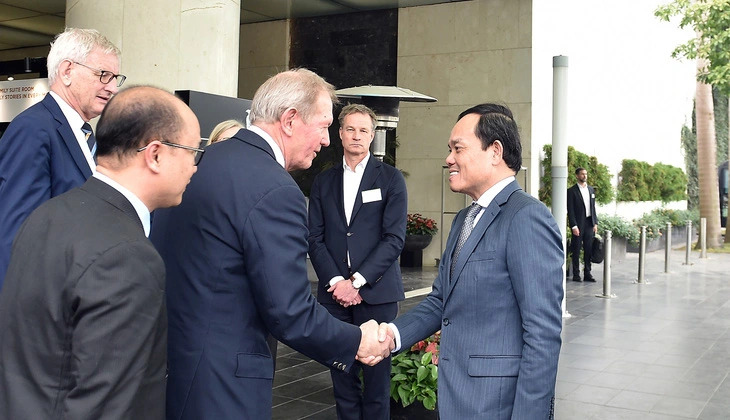
SEB, the largest Nordic bank headquartered in Sweden, chose Hanoi to host the annual conference for Nordic businesses leaders last month, once again reaffirming Vietnam’s potential in the eyes of the European investors, especially in the fields of renewable energy, green business, and manpower.
After the conference ended, Marcus Wallenberg, chairman of the SEB board of directors, confirmed to Tuoi Tre (Youth) newspaper that all of the 90 CEOs and directors of corporate groups that were in attendance held positive outlooks toward business opportunities in Vietnam.
Vietnam as a changing nation
Deputy Prime Minister Tran Luu Quang, on behalf of the Vietnamese government, informed the Nordic businesses during the conference the areas in which Vietnam was prioritizing foreign investment as well as commitments that the country was willing to make to them.
Wallenberg remarked that Vietnam is resolutely committed to growth and is implementing essential reforms and adjustments to achieve that objective.
However, he also said that Vietnam needs to speed up the process of granting investment licenses and streamline a method to help foreign businesses learn about the investing process.
About 50 percent of the businesses attending this conference did not have existing operations in Vietnam.
When enquired about the reason behind their visit, the SEB executive stated that the delegation of Nordic businesses and their Vietnamese counterparts discussed a wide range of topics, such as business practices and what Vietnam’s capabilities and challenges were.
The most popular subjects were the transition to a green economy, renewable energy, and human resources.
Vietnam needs to consider the issue of supplying renewable energy to businesses, according to the SEB chairman, because many Nordic businesses have insisted on using clean energy in production due to their commitments on reducing emissions.
Wallenberg also believed that companies in Northern Europe, with their expertise in clean energy supply chains, are well-positioned for future collaboration with Vietnam.
He was particularly impressed by Vietnam’s diplomatic strategy, pointing out the country’s ability to balance its relationships with major powers like the United States and China, which has made it an appealing destination for foreign investments.
More delegations from Northern Europe to come
Trade counselor Nguyen Thi Hoang Thuy, stationed at the Vietnam Trade Office in Sweden (also covering Denmark, Finland, Iceland, Norway, and Latvia), noted that despite being small in size, Nordic countries possess significant economic potential and advanced capabilities in industries that establish consumer trends.
Thus, the best course of action is to draw in big companies with the financial wherewithal to make investments in export-oriented industries and enterprises that already have extensive international distribution networks.
“Suppose these corporations invest in production facilities in Vietnam, then export their products through their distribution networks, it will not only boost investment but also increase exports of raw materials on-site and overall export turnover, benefiting not just Northern Europe but also other countries,” Thuy explained.
“After the Nordic CEO conference organized by the SEB, we would follow up with a series of seminars to introduce the investment and business environment in Vietnam.”
In addition to natural assets, according to Thuy, Vietnam has three great advantages that can be and have been leveraged to attract Nordic investment.
Firstly, the country demonstrates a robust commitment and comprehensive plans for sustainable development aimed at achieving net-zero emissions by 2050.
“LEGO is often used as a demonstration for high-quality investment projects,” Thuy said.
“The investment of large, sustainable businesses like LEGO in Vietnam will have a spillover effect, helping to encourage other Nordic businesses to continue investing in Vietnam.”
LEGO made an unprecedented US$1 billion investment in 2022 into Vietnam in the form of a factory in Binh Duong Province, just outside Ho Chi Minh City, which was anticipated to finish construction and begin operations in 2024.
Another big advantage comes from what is known as the China Plus One Strategy, which according to Source of Asia is a strategy designed to diversify businesses’ investment and lessen their dependence on China as a production destination.
This makes Vietnam appear more attractive as a potential production base due to its proximity to China and lower production costs, evidenced by Apple and Samsung’s recent investments and interest in Vietnam.
Lastly, the European Union-Vietnam Free Trade Agreement, which has been in effect since August 2020, will benefit EU businesses overall, with Nordic companies in particular benefiting from rules of origin if they invest in Vietnam, produce goods, and then export them back to EU markets.
The forthcoming EU-Vietnam Investment Protection Agreement is poised to bring significant benefits.
Vietnam has been diligently lobbying the remaining few countries in the EU to ratify the agreement, and it has received positive responses./.
Hanh Chu – Duy Linh




